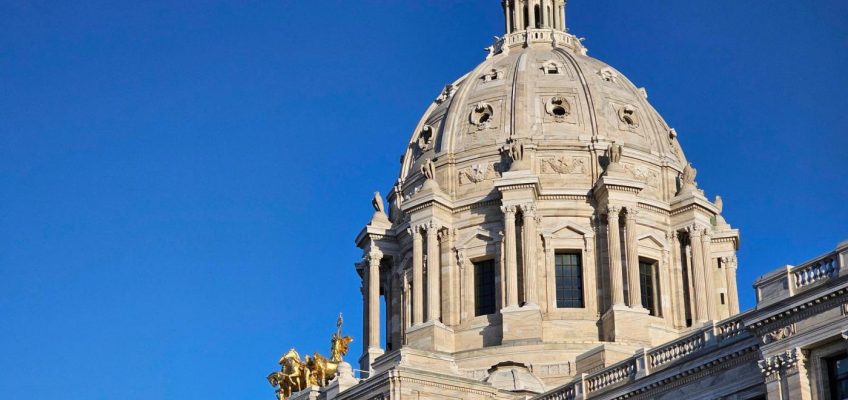Hopes of state lawmakers passing a more than $60 billion two-year budget on time are fading at the Minnesota Capitol.
Daily marathon negotiation sessions between Gov. Tim Walz, the Democratic-Farmer-Labor majority Senate and the House tied 67-67 between the DFL and Republicans, have failed to produce a final budget deal.
On Wednesday, Democratic-Farmer-Labor leaders said it’s increasingly likely lawmakers will have to go into overtime, as it’ll be difficult to beat the May 19 deadline to pass bills. The government shuts down on July 1 if they can’t reach an agreement.
Speaking to reporters outside the governor’s cabinet room Wednesday, Senate Majority Leader Erin Murphy, DFL-St. Paul, said it’s important the Legislature gets the budget right and doesn’t push its staff too hard in the final days of the regular session.
Sen. Erin P. Murphy. (Courtesy of the Minnesota Senate)
“I do think it is important to recognize that human beings work here and human beings need sleep,” she said, later stating more plainly: “I think a special session is very, very likely if not inevitable.”
House DFL Leader Melissa Hortman said weeks ago that she expected a special session. Republican leaders say they remain hopeful a deal can be reached before Monday’s midnight legislative deadline, but as of Thursday, there are only five days remaining to pass bills.
Gov. Tim Walz.
“I still think there’s a chance we can get this thing by the time, but I think as the hours go by, it becomes a little more difficult,” Walz said at a Tuesday news conference unrelated to the budget.
He added that the special session may happen soon after next Monday’s adjournment and needn’t drag on for days if he and leaders can reach a deal before officially returning to the Capitol for business. The governor calls a special session.
Taxpayer cost?
State leaders’ inability to finish their work on time will cost Minnesota taxpayers, though exactly how much is hard to pin down. It will depend on the number of days and the amount of work they’ll need to complete. The cost could be more than $17,000 a day.
Senators and representatives earn a yearly salary of $51,750, and they can collect $86 per day per diem for meals and other incidental expenses.
Legislative salaries are fixed, but if all 201 members of the Senate and House collected their full per diem, it will cost the state $17,286 per day.
That’s the maximum, and it’s not likely all lawmakers will claim the full amount. They haven’t in the past. House Public Information Services in 2019 estimated that a special session costs the state anywhere from $10,000 to $20,000 per day.
Other costs that are harder to pin down include pay for seasonal legislative staff who will work overtime. Operations at the Capitol also carry costs.
Lengths can vary
The lengths of special sessions can vary greatly.
In 2021, lawmakers returned to the Capitol for 24 days from mid-June to early July to pass the 2021-2023 budget and address an extension of Walz’s COVID-19 peacetime emergency. In 2017, lawmakers convened for three days to complete the budget.
In 2019, lawmakers only returned to the Capitol for one day immediately following the regular session to pass a previously negotiated budget bill, which didn’t have quite enough time to reach the finish line of the regular session.
Walz told reporters this week that his hope is that this year’s special session would be the same if he ends up calling one.
Overtime is more common
This year’s legislative session got off to a slow start as the House DFL, temporarily at a one-seat disadvantage, boycotted the session for three weeks to deny a temporary Republican majority quorum to pass bills and conduct other business.
That ate into the Legislature’s time, but special sessions have become increasingly common in recent history, especially during a budget year.
Often, the governor calls a special session to address emergencies, as Walz did several times during the COVID-19 pandemic. They’ve also become the norm for passing a budget under divided government. The last time a divided government passed a budget without a special session was 2007.
DFL trifectas — where one party controls the governor’s office, Senate and House — passed budgets with no special session in 2013 and 2023. In all other years without one party control, lawmakers had to return to the Capitol for overtime.
In 2011, Minnesota’s government shut down for 20 days after Gov. Mark Dayton and the Republican-controlled Legislature couldn’t reach an agreement on the budget.
Sticking points
The Legislature is working with a $456 million surplus for the next two years, but a $6 billion deficit looms in 2028-2029.
What the state should cut to prepare for that bleaker outlook is central to the debate between DFLers and the GOP. Many Democrats are hesitant to water down new social programs and mandated employer benefits they created in 2023.
Key sticking points include unemployment benefits for hourly public school employees, which Republicans want to end. The DFL budget frameworks lean on funding cuts for nursing homes and long-term disability waivers, which Republicans oppose.
There are also debates over whether the state should continue offering MinnesotaCare coverage to people without legal immigration status. Republicans claim that it will cost the state a significant amount in the future based on higher-than-expected enrollment, but so far, the costs they predict have not materialized.
Related Articles
MN moves to strengthen DWI laws after fatal St. Louis Park crash
With one week left, what’s happening with the MN budget at the Legislature?
Joe Soucheray: No other governor has tried to pull off this pathetic budget stunt
Gov. Walz encourages legislators, and anglers, to get the lead out
Minnesota Senate OKs new anti-fraud office, but much work remains


Leave a Reply